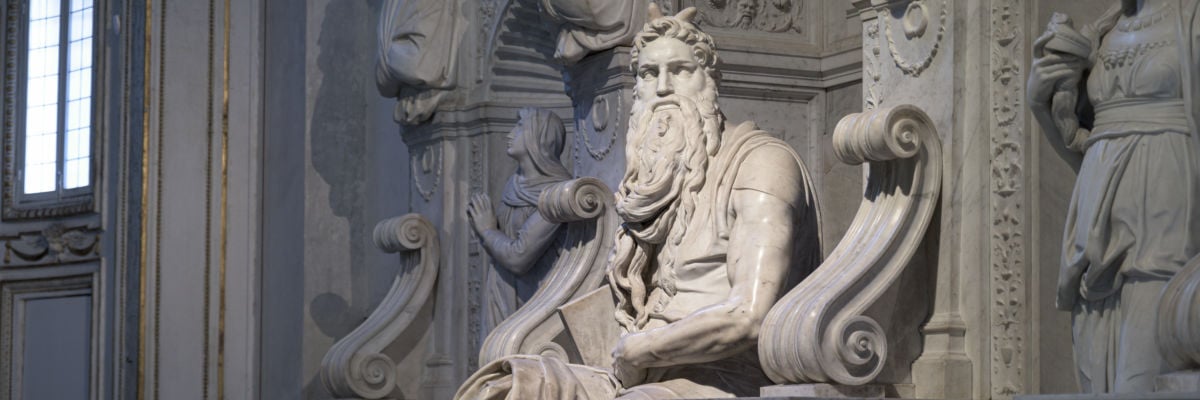
Anti-Catholics regularly bash the Church with the Inquisition, especially the Spanish Inquisition, asserting that it shows how evil the Church truly is. This charge should be anticipated by us. Any amount of dealing with anti-Catholics is bound to bring it to the surface. What almost nobody expects is for a Catholic to reply by pointing to the biblical “Mosaic Inquisition.”
Yes, it’s true. There was an “Inquisition” recorded in the Bible. In Deuteronomy 17, we read:
“If there is found among you . . . a man or woman who . . . has gone and served other gods and worshiped them, or the sun or the moon or any of the host of heaven, . . . then you shall inquire diligently, and if it is true and certain that such an abominable thing has been done in Israel, then you shall bring forth to your gates that man or woman who has done this evil thing, and you shall stone that man or woman to death with stones” (Deut. 17:2–5).
The text says the Israelites were to “inquire diligently” whether the thing was true. This did not refer to asking a few informal questions and then stoning the person on that basis. That would like having a lynching. As with any case of capital punishment commanded by God’s word, a public legal proceeding—a trial—was called for. The diligent inquiry was thus a legal inquiry—an inquisition. Its purpose was to protect the person accused of practicing a false religion, to make sure he really had committed the crime in question. Legal safeguards were built into the process:
“On the evidence of two witnesses or of three witnesses he that is to die shall be put to death; a person shall not be put to death on the evidence of one witness. The hand of the witnesses shall be first against him to put him to death, and afterward the hand of all the people. So you shall purge the evil from the midst of you” (Deut. 17:6–7).
By making sure there were multiple witnesses, and that the witnesses were serious enough to take the lead in the execution itself, the chances of a false conviction were reduced.
If the accused had committed the crime of idolatry, he was to be executed to protect the community, lest the false religion spread among God’s people. Even one’s intimate companions had to be turned over to protect the community:
“If your brother, the son of your mother, or your son, or your daughter, or the wife of your bosom, or your friend who is as your own soul entices you secretly, saying, ‘Let us go and serve other gods,’ . . . you shall not yield to him or listen to him, nor shall your eye pity him, nor shall you spare him, nor shall you conceal him. . . . You shall stone him to death with stones, because he sought to draw you away from the Lord your God. . . . And all Israel shall hear, and fear, and never again do any such wickedness as this among you” (Deut. 13:6–11).
If the community needed to be protected from private individuals spreading false religion, it certainly needed to be protected from religious leaders such as prophets and visionaries—who already had reputations as holy men—doing so:
“If a prophet arises among you, or a dreamer of dreams, and gives you a sign or a wonder, and the sign or wonder which he tells you comes to pass, and if he says, ‘Let us go after other gods’ . . . you shall not listen to the words of that prophet or to that dreamer of dreams; for the Lord your God is testing you, to know whether you love the Lord your God with all your heart and with all your soul. . . . But that prophet or that dreamer of dreams shall be put to death, because he has taught rebellion against the Lord your God” (Deut. 13:1–5).
The penalty for practicing false religion even applied to whole towns:
“If you hear in one of your cities . . . that certain base fellows have gone out among you and have drawn away the inhabitants of the city, saying, ‘Let us go and serve other gods,’ . . . then you shall inquire and make search and ask diligently; and behold, if it be true and certain that such an abominable thing has been done among you, you shall surely put the inhabitants of that city to the sword, destroying it utterly” (Deut. 13:12–15).
These are strong words, but they are part of what God’s inspired word declares. Those practicing false religions—whether individuals, religious leaders, or whole towns—were to be put to death to protect the broader community. This is not to say that such measures are meant for our time and culture. But they do form the biblical background to similar practices—used by both Catholics and Protestants—in the Christian age. Given scriptural passages such as these, we cannot simply condemn our ancestors from atop a twentieth-century moral high horse. Whether we are Catholic or Protestant, our forebears read these passages and felt bound in conscience to implement them in their own societies—a fact we cannot discount in forming a moral appraisal of their actions.



